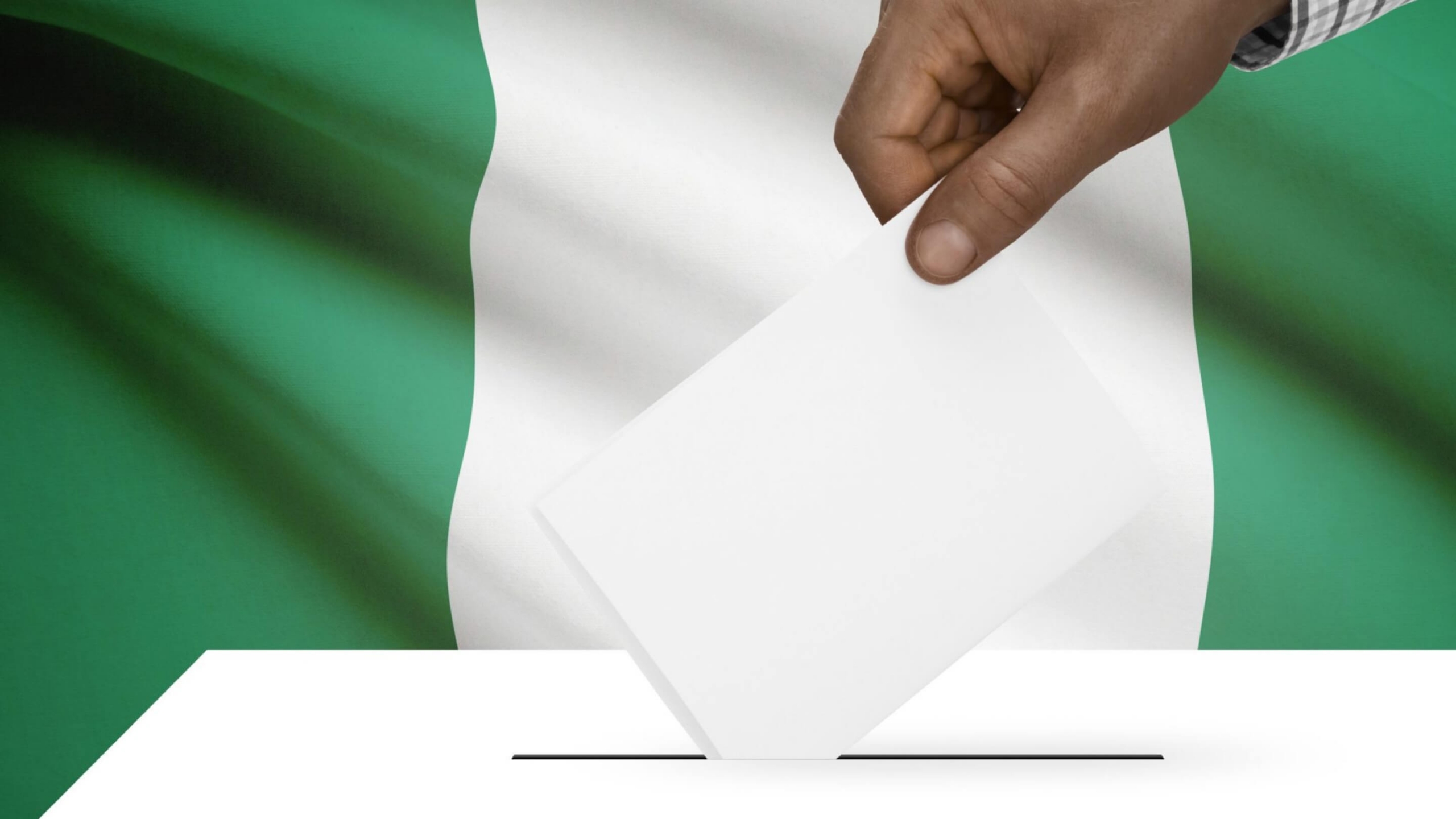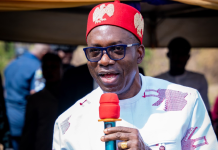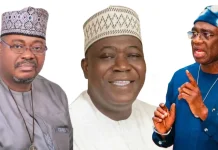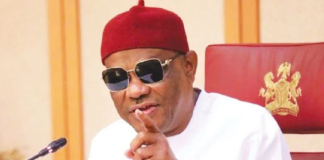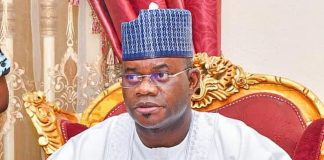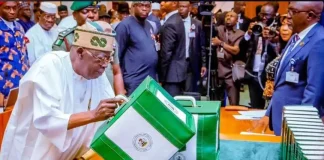🌿 Ruzu Non-Alcoholic Herbal Bitters
Ruzu Non-Alcoholic Herbal Bitters is a natural health supplement specially formulated to:
- ✅ Promote general wellness
- ✅ Detoxify the body
- ✅ Support the treatment of various ailments
Made from a powerful blend of 100% organic and medicinal herbs, Ruzu is completely alcohol-free, making it ideal for:
- 👪 All age groups
- 🌱 Health-conscious individuals
- 🌿 Anyone seeking non-alcoholic herbal remedies
Whether you're looking to boost your vitality, cleanse your system, or support healing the natural way, Ruzu Bitters offers a trusted herbal solution.
Nigeria’s next presidential election is about two years away, and political activity is already at an all-time high.
Political parties and individuals are already campaigning in defiance of the Electoral Act, which clearly stipulates that no sort of campaigning is permitted until 150 days before to the election.
A lot of Nigerians are concerned that political leaders have turned their focus away from running the country and onto campaigning in preparation for the 2027 election.
Moreover, the Independent National Electoral Commission (INEC), the electoral authority tasked with carrying out its constitutional mandate to control political party activity, is doing nothing in this area.
The same is true of the police, who are investigating impunity despite their constitutional duty to detain and prosecute lawbreakers.
Last week, Prof. Mahmood Yakubu, the chairman of INEC, expressed concern that political parties had already begun running covert campaigns in defiance of explicit rules that limited them to 150 days prior to the electoral date.
In his remarks at a one-day stakeholders’ roundtable on the difficulties of early political campaigns held at the Electoral Institute in Abuja, Yakubu referred to a “disturbing trend” of political campaigning ahead of schedule, particularly in light of the 2027 general elections, the Federal Capital Territory Area Council elections, and the upcoming off-cycle governorship elections.
He referenced Section 94(1) of the Electoral Act 2022, which stipulates that no campaign activity may begin more than 150 days prior to the day of the election and that all campaign activities must conclude 24 hours prior to the start of the voting process.
He bemoaned the fact that political actors frequently ignored this clause, though. “Even though the electoral commission has not yet released the schedule of election-related activities, political parties, candidates, and their supporters appear to be in a perpetual election mood.”
“We have witnessed media campaigns, outdoor ads, and even rallies promoting different political parties and candidates all over the nation,” he stated.
However, he cautioned that these early actions seriously jeopardize the commission’s ability to enforce campaign finance limits, stating, “These actions and activities undermine the commission’s ability to track campaign finance limits as politicians, prospective candidates, and third-party agents expend large amount of money that cannot be effectively monitored before the official begins of campaigns.”
Read Also: Exposed: How Charter Airlines Use Temporary Import Permits for Fraud in Nigeria
Across the political spectrum, the development has sparked strong responses. The INEC chairman’s admission that the election umpire is powerless to stop the nasty trend is what many Nigerians, especially those who have closely followed the country’s political happenings over the past two years, find troubling.
While campaigning within 24 hours of an election is punishable by a maximum fine of N500,000 under Section 94(2) of the Electoral Act 2022, Professor Yakubu noted that campaigns conducted more than 150 days prior to an election are not subject to any penalties.
He said that this is where the Commission’s task of handling the early campaign comes in.
Early campaigning is not a new problem, he admitted, but said that regulatory authorities’ inability to address it within the current legislative framework called for more careful consideration.
However, there are other people who think that because the ruling All Progressives Congress, or APC, is heavily involved, INEC and the police are not doing much to stop the trend.
Concerns about the unpleasant trend have been voiced by a number of people and organizations, including the major opposition political parties. They fear that the 2027 election may already be compromised unless immediate and serious action is taken to halt the trend.
Both the African Democratic Congress (ADC) and the opposition Peoples Democratic Party (PDP) called for strong action to stop the practice, accusing the ruling APC of being the greatest perpetrator.
In addition to expressing its concern, the Socio-Economic Rights and Accountability Project (SERAP) has threatened to sue Yakubu’s INEC for failing to fulfill its constitutional obligations, including punishing early election campaigners.
Yakubu was given the task by the organization to find politicians and political parties who are flagrantly breaking international norms, constitutional law, and statutes that forbid early election campaigns and guarantee their prosecution as well as that of their backers.
It further encouraged him to keep a close eye on political parties that violate this rule and to create explicit rules that would regulate the behavior of politicians and parties in relation to early election campaigns in Nigeria.
Kolawole Oluwadare, the Deputy Director, signed the letter from SERAP dated September 13 that contained this call.
INEC is not powerless when political parties, candidates, and other politicians violate the legally mandated election campaign period, according to SERAP, which rejected the idea that INEC is powerless. It is unlawful and unconstitutional to run for office early.
The statutory and constitutional mandates of INEC include the ability to punish or penalize electoral offenses, such as early election campaigns.
“It is important to avoid interpreting INEC as endorsing or validating political parties, candidates, and other politicians who run early election campaigns outside of the legally mandated campaign period.”
SERAP cautioned that the country’s economic development is negatively impacted by early election campaigns because of the protracted electioneering frenzy. State governors in particular, the committee bemoaned, are squandering public monies on such early campaigns at the expense of the populace.
Early election campaigns violate the word and spirit of the Nigerian Constitution 1999 [as amended], the Electoral Act, and the nation’s international human rights commitments because INEC has not yet released the schedule of events for the elections.
“A number of state governors appear to be leveraging the windfall from fuel subsidies for early election campaigns. Despite a notable rise in revenue since the withdrawal of gasoline subsidies, a number of state governors are egregiously failing to finance social and economic growth and provide their citizens with basic amenities.
Since it would promote equality, freedom, and human dignity, enforcing the ban on early election campaigns would be reasonable, justified, and proportionate. “INEC has extensive constitutional and legal responsibilities to defend the public interest and to advance, defend, and enforce the rule of law,” the statement said.
A culture of impunity might be established if the practice is permitted to continue, according to SERAP. A culture of impunity for offenders and their backers would be established if INEC failed to equitably enforce the country’s international human rights commitments as well as the constitutional and statutory bans on early election campaigns, the statement stated.
INEC is tacitly endorsing the violations of the Nigerian Constitution, the Electoral Act, and the nation’s international human rights commitments by not taking action against or sanctioning political parties, candidates, and other politicians for running early election campaigns.
We thus ask that the above actions be made within seven days of this letter being received and/or published. In order to force you and INEC to abide by our request in the public interest, SERAP will take all necessary legal measures if we don’t hear back from you by then.
Instead of giving their constituents competent administration, state governors and other politicians are putting up campaign banners all around the nation to get votes.
The Nigerian Constitution and the Electoral Act both expressly forbid early election campaigns, and INEC may use section 83 of the Act to ask political parties for information or clarification on how they are adhering to this ban and to order the parties to immediately stop the practice.
Section 83(4) of the Nigerian Constitution stipulates that INEC should punish candidates and political parties who disregard its mandate.
The Nigerian Constitution’s section 225 should be used to force political parties to disclose the source or sources of finance used by their candidates and parties for early election campaigns.
“Before the 150 days allowed by the Electoral Act, a number of political parties, candidates, and other politicians are advocating for themselves and seeking votes. Political candidates, parties, and other politicians are not above the law.
Early election campaigns compromise the Nigerian Constitution’s chapters two and four, which address fundamental rights, state policy directives, and aims.
Yusuf Shehu, a former Katsina State lawmaker, criticized the electoral board for its inaction as politicians tamper with the nation’s voting process in his contribution.
He stated: “The Nigerian Constitution and the Electoral Act’s drafters never imagined that the political season would be an ongoing event.” If public officials don’t follow the constitutional Code of Conduct for Public Officers, they will be subject to legal repercussions.
“A number of candidates and other elected public officials have disregarded their constitutional oath of office, which commits them to upholding, defending, and promoting Nigeria’s prosperity and well-being.
Several state governors and other politicians are putting election campaigns ahead of the socioeconomic progress of Nigerians, particularly the underprivileged and marginalized segments of society.
Early election campaigns allow public resources to be diverted and public services to be disrupted. They also make it more difficult for residents to receive public goods and services because they unfairly favor incumbent or well-funded candidates, undermining impartiality, justice, and transparency.
If political parties, candidates, and other politicians are not held accountable for running early election campaigns, elected officials will be able to continue using public funds for their own political ends. Conflicts of interest would also arise, public service standards would be broken, and the impartiality of public offices would be compromised.
In order to deter future violations of the regulations governing early election campaigns, human rights attorney Femi Falana has also requested that INEC arraign individuals who violate them before the court.
When Falana appeared on Sunday Politics on Channels Television, she made the call.
The constitution did not specify the proper sanction, he agreed with the INEC head, but he said, “The law cannot cover all situations.” Legislators believed they were interacting with a civilized upper class. No.
Given their current legal infractions, it is imperative that rules and restrictions be implemented, as authorized by the Constitution and the Electoral Act.
It should be noted that INEC must bring charges against a few of these individuals in court. “Sorry, my Lord, there is no provision for punishment.” Let them appear in court.
“You will be imprisoned for contempt if you continue to disregard the court’s order.”
He said that INEC is empowered by the constitution to create rules and regulations to fill in this gap, stating that “INEC is empowered to draft rules and regulations under Section 95.” INEC is empowered to oversee campaigns in accordance with its established rules and regulations by the Constitution’s Paragraph F, Part 1. As a result, INEC should immediately implement laws and regulations to curb this illegality.
Even the former chairman of INEC, Prof. Attahiru Jega, expressed alarm about Nigeria’s increasing tendency toward early election campaigns, cautioning that if the issue is not handled immediately, it might seriously jeopardize the integrity of the 2027 elections.
Jega, who spoke at a stakeholders’ meeting last week in Abuja that INEC organized to look at the difficulties of early campaigns In his speech, he pointed out that campaigns that were run outside of the legally mandated time frame gave some candidates unfair advantages, weakened the rule of law, heightened political tensions, and solidified a climate of impunity among political players.
Although he acknowledged that MPs were the primary benefactors of early campaigns and were thus unlikely to enact legislation to impose harsher penalties on premature campaigners, he nevertheless blamed “matured Democrats” for early campaigns and election law infractions.
Election campaigns that start too soon are unwelcome anomalies in democratic elections. He cautioned that they may even lead to political friction and conflict, disobey the law, and create an unfair playing field.

